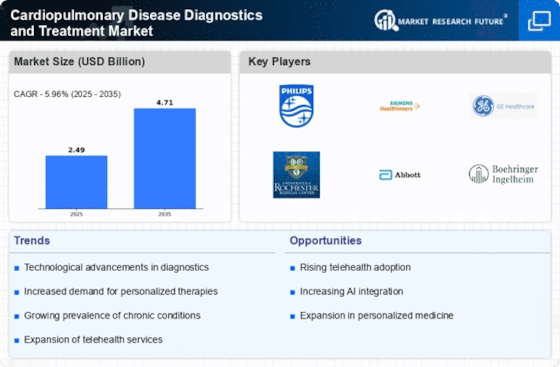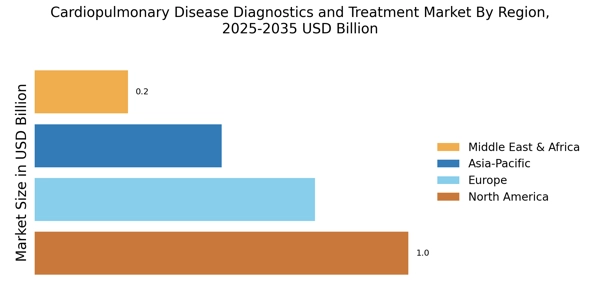Regulatory Support for Innovative Treatments
Regulatory bodies are increasingly supporting the development of innovative treatments within the Cardiopulmonary Disease Diagnostics and Treatment Market. Initiatives aimed at expediting the approval process for new therapies and diagnostic tools are becoming more common. This regulatory environment encourages pharmaceutical and biotechnology companies to invest in research and development, leading to the introduction of novel treatment options for cardiopulmonary diseases. For instance, recent policies have facilitated faster access to breakthrough therapies, which could significantly improve patient outcomes. As these innovations enter the market, they are likely to attract attention from healthcare providers and patients alike, thereby driving demand for advanced diagnostic and treatment solutions. This supportive regulatory landscape is expected to play a pivotal role in shaping the future of the market.
Rising Prevalence of Cardiopulmonary Diseases
The increasing incidence of cardiopulmonary diseases is a primary driver for the Cardiopulmonary Disease Diagnostics and Treatment Market. Conditions such as chronic obstructive pulmonary disease (COPD) and heart failure are becoming more prevalent, largely due to aging populations and lifestyle factors. According to recent data, it is estimated that by 2025, the number of individuals suffering from these diseases could reach unprecedented levels, necessitating advanced diagnostic and treatment solutions. This surge in patient numbers is likely to stimulate demand for innovative diagnostic tools and therapeutic options, thereby propelling market growth. Furthermore, the economic burden associated with these diseases underscores the urgent need for effective management strategies, which could further enhance the market landscape.
Technological Innovations in Diagnostic Tools
Technological advancements are revolutionizing the Cardiopulmonary Disease Diagnostics and Treatment Market. Innovations such as artificial intelligence, machine learning, and advanced imaging techniques are enhancing the accuracy and efficiency of diagnostics. For instance, AI-driven algorithms can analyze imaging data with remarkable precision, leading to earlier detection of cardiopulmonary conditions. The market for diagnostic imaging is projected to grow significantly, with estimates suggesting a compound annual growth rate of over 7% in the coming years. These advancements not only improve patient outcomes but also streamline healthcare processes, making them more cost-effective. As healthcare providers increasingly adopt these technologies, the demand for sophisticated diagnostic tools is expected to rise, further driving market expansion.
Growing Investment in Healthcare Infrastructure
Investment in healthcare infrastructure is a crucial factor influencing the Cardiopulmonary Disease Diagnostics and Treatment Market. Governments and private entities are allocating substantial resources to enhance healthcare facilities, particularly in developing regions. This investment is aimed at improving access to diagnostic and treatment services for cardiopulmonary diseases. For example, the establishment of specialized cardiopulmonary care centers is on the rise, which is likely to facilitate better patient management and outcomes. Additionally, the integration of telemedicine and remote monitoring technologies is becoming more prevalent, allowing for timely interventions and follow-ups. As healthcare systems evolve, the demand for comprehensive cardiopulmonary diagnostics and treatment solutions is expected to grow, thereby propelling market dynamics.
Increased Awareness and Education on Cardiopulmonary Health
The heightened awareness regarding cardiopulmonary health is significantly impacting the Cardiopulmonary Disease Diagnostics and Treatment Market. Public health campaigns and educational initiatives are informing individuals about the risks associated with cardiopulmonary diseases, leading to earlier diagnosis and treatment. This awareness is fostering a proactive approach to health management, encouraging individuals to seek medical advice and undergo regular screenings. As a result, healthcare providers are witnessing an uptick in patient consultations for cardiopulmonary issues. Moreover, the emphasis on lifestyle modifications and preventive measures is likely to drive demand for diagnostic services, as individuals become more engaged in their health. This trend is expected to contribute positively to market growth in the coming years.


















